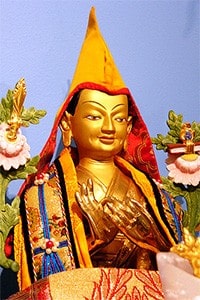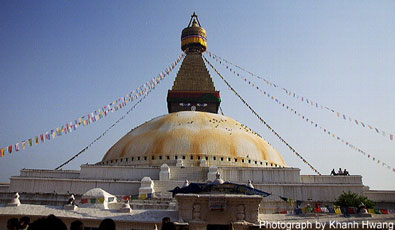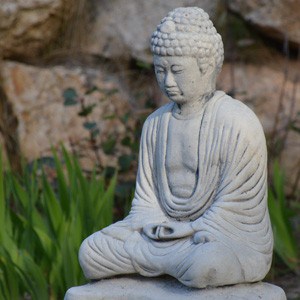The Foundation of All Good Qualities

The kind and venerable spiritual mentor is the foundation of all good qualities. Seeing that dependence on him or her is the root of the path, I request inspiration to rely on him or her with great respect and continuous effort.
A human life with leisure is obtained this once. Understanding that it has great value and is hard to find, I request inspiration to generate unceasingly the mind that takes hold of its essence day and night.
The fluctuation of our body and life is like a bubble of water; remember death, for we perish so quickly. After death, the effects of black and white karma pursue us as a shadow follows a body. Finding certainty in this, I request inspiration to always be careful to abandon even the slightest negative action and to complete the accumulation of virtue.
There is no satisfaction in enjoying worldly pleasures. They are the door to all misery. Having realized that the fault of samsaric perfections is that they cannot be trusted, I request inspiration to be strongly intent on the bliss of liberation.
That pure thought (to attain liberation) produces great conscientiousness, mindfulness, and awareness. I request inspiration to make the essential practice keeping the vows of individual liberation,1 the root of the doctrine.
Having seen that all beings, my kind mothers, have fallen like me into the ocean of cyclic existence, I request inspiration to train in the supreme altruistic intention, assuming the responsibility to free all migrating beings.
Generating the altruistic intention alone, without cultivation of the three ethical practices,2 does not lead to awakening. Having realized this, I request inspiration to practice with intense effort the vows of the conquerors and their spiritual children.
By quieting distraction to false objects, and analyzing the meaning of reality,3 I request inspiration to generate quickly within my mindstream the path uniting serenity and insight.
When, trained in the common path,4 I am a suitable vessel, I request inspiration to enter with ease the great gateway of the fortunate ones, the Vajrayana,5 the supreme of all vehicles.
The basis of achieving the two powerful attainments is the pure vows and commitments that I have pledged. Having found true understanding of this, I request inspiration to keep them even at the cost of my life.
Having realized the significance of the two stages,6 which are the essence of the tantric path, I request inspiration to steadfastly practice without laziness the four sessions of yoga and realize what the holy beings have taught.
May the spiritual teachers who lead me on the sacred path and all spiritual friends who practice it have long life. Please inspire me to quickly and completely pacify all outer and inner hindrances.
In all my rebirths may I never be separated from perfect spiritual mentors, and enjoy the magnificent Dharma. Completing all qualities of the stages and paths, may I quickly achieve the stage of Vajradhara.7
Click here for Lamrim outline and teachings
About this prayer
Since the Buddha taught a wide variety of audiences, beginners are sometimes confused about where to start and how to progress. In the early 11th century, the Indian sage Lama Atisha extracted the essential points from the Buddha’s teachings and ordered them into a gradual path. This text is called The Lamp of the Path. Lama Tsongkhapa (1357-1419), an important Tibetan master expanded on the points of Lama Atisha’s text and wrote The Great Exposition on The Gradual Path to Enlightenment (Lamrim Chenmo). The Foundation of All Good Qualities is a prayer by Lama Tsongkhapa that outlines the lamrim teachings.
The lamrim teachings set out in a clear manner the steps to realize enlightenment. We can gradually become familiar with the attitudes and actions contained within these steps through The Foundation of All Good Qualities and make our lives more meaningful.
The vows of individual liberation include the five lay precepts, the vows of novice and fully-ordained monks and nuns, and the one-day vows. ↩
The three ethical practices are restraining from negative actions, accumulating virtuous ones, and working for the benefit of sentient beings. ↩
Objects are false in that their way of appearance and way of existence do not accord, i.e. although objects appear to be inherently existent, in fact they are not; they are empty of inherent existence. ↩
The common path is the general path of the sutrayana (determination to be free, dedicated heart, wisdom realizing emptiness) and the path of the three lower tantras. ↩
Vajrayana (the tantric path) is a branch of the Mahayana and contains special techniques for transforming one’s ordinary body, speech and mind into the body, speech and mind of a Buddha. ↩
The two stages are the generation stage and the completion stage of the highest class of tantra. ↩
Vajradhara is the form that Shakyamuni Buddha appeared in when he taught the tantras. ↩
Lama Tsongkhapa
Je Tsongkhapa (1357–1419) is an important master of Tibetan Buddhism and founder of the Gelug school. He is also known by his ordained name, Lobsang Drakpa, or simply as Je Rinpoche. Lama Tsongkhapa heard the Buddha’s teachings from masters of all Tibetan Buddhist traditions and received lineage transmission in the major schools. His main source of inspiration was the Kadampa tradition, the legacy of Atiśa. He expanded on the points of Lama Atisha's text and wrote The Great Exposition on The Gradual Path to Enlightenment (Lamrim Chenmo), which sets out in a clear manner the steps to realizing enlightenment. Based on Lama Tsongkhapa’s teachings, the two distinguishing characteristics of the Gelug tradition are the union of Sutra and Tantra, and emphasis on the Lamrim along the three principal aspects of the path (a genuine wish for renunciation, generation of bodhicitta, and insight into emptiness). In his two main treatises, Lama Tsongkhapa meticulously set forth this graduated way and how one establishes oneself in the paths of Sutra and Tantra. (Source: Wikipedia)


